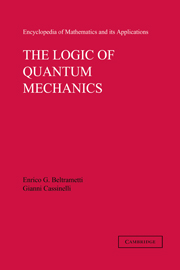Book contents
- Frontmatter
- Contents
- Editor's Statement
- Foreword
- Preface
- The Logic of Quantum Mechanics
- Part I HILBERT-SPACE QUANTUM MECHANICS
- Part II BASIC STRUCTURES IN THE DESCRIPTION OF QUANTUM SYSTEMS
- Chapter 10 The Typical Mathematical Structure of Propositions: Orthomodular AC Lattices
- Chapter 11 Probability Measures on Orthomodular Posets and Lattices
- Chapter 12 Characterization of Commutativity
- Chapter 13 States and Propositions of a Physical System
- Chapter 14 Quantum-Mechanical Features in Terms of the Logic of the Physical System
- Chapter 15 On the Hidden-Variables Issue
- Chapter 16 Proposition-State Structure and Idealized Measurements
- Chapter 17 Superpositions of States and Closure Spaces
- Chapter 18 Transition-Probability Spaces and Quantum Systems
- Chapter 19 On the Convex-Set Approach
- Chapter 20 Introduction to a Quantum Logic
- Part III RECONSTRUCTION OF HILBERT-SPACE QUANTUM MECHANICS
- Appendix A Trace-Class Operators
- Appendix B The Spectral Theorem
- Appendix C Proofs for Chapter 11
- Subject Index
- Miscellaneous Endmatter
Chapter 13 - States and Propositions of a Physical System
Published online by Cambridge University Press: 05 June 2013
- Frontmatter
- Contents
- Editor's Statement
- Foreword
- Preface
- The Logic of Quantum Mechanics
- Part I HILBERT-SPACE QUANTUM MECHANICS
- Part II BASIC STRUCTURES IN THE DESCRIPTION OF QUANTUM SYSTEMS
- Chapter 10 The Typical Mathematical Structure of Propositions: Orthomodular AC Lattices
- Chapter 11 Probability Measures on Orthomodular Posets and Lattices
- Chapter 12 Characterization of Commutativity
- Chapter 13 States and Propositions of a Physical System
- Chapter 14 Quantum-Mechanical Features in Terms of the Logic of the Physical System
- Chapter 15 On the Hidden-Variables Issue
- Chapter 16 Proposition-State Structure and Idealized Measurements
- Chapter 17 Superpositions of States and Closure Spaces
- Chapter 18 Transition-Probability Spaces and Quantum Systems
- Chapter 19 On the Convex-Set Approach
- Chapter 20 Introduction to a Quantum Logic
- Part III RECONSTRUCTION OF HILBERT-SPACE QUANTUM MECHANICS
- Appendix A Trace-Class Operators
- Appendix B The Spectral Theorem
- Appendix C Proofs for Chapter 11
- Subject Index
- Miscellaneous Endmatter
Summary
Yes-No Experiments
The first five sections of this chapter are intended to provide some intuitive physical content to the notions of state and proposition of a quantum system. We deliberately avoid any deductive attitude, and we also avoid formalizations: the ingredients we shall start with (yes-no experiments and preparations) are so primitive and unstructured that the construction of quantum mechanics out of them is certainly not at hand. What we are going to see is simply that there is natural physical motivation for the occurrence at the very basis of every statistical theory—quantum mechanics in particular—of an ordered structure of propositions, of a convex structure of states, and of a relationship between these structures that makes the states behave as probability measures on propositions. From Section 13.6 on, we shall sketch a more formalized model, based on Mackey's approach.
By a yes-no experiment is meant an experiment that makes use of a measuring instrument having just two outcomes, which without loss of generality we can agree to label “yes” and “no”. Of course, when talking of a yes-no experiment we always imagine that we have specified the physical system to which it pertains. We also imagine that the interaction between
Information
- Type
- Chapter
- Information
- The Logic of Quantum Mechanics , pp. 137 - 151Publisher: Cambridge University PressPrint publication year: 1984
